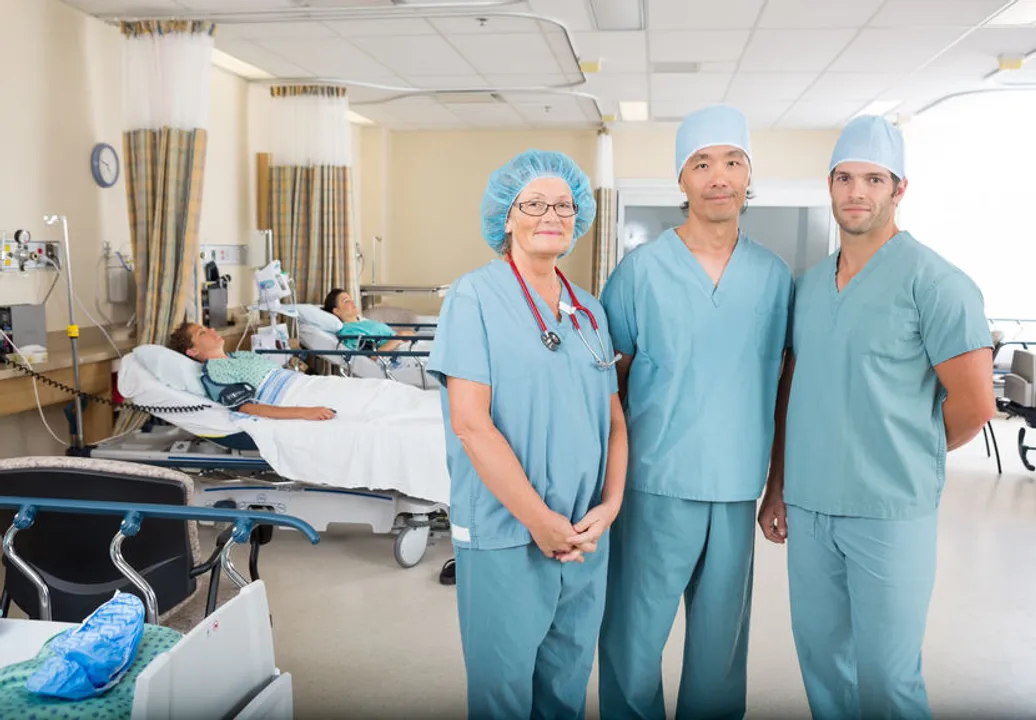Perianesthesia Nursing (PACU) Career Analysis

Tyler Olson/123RF.com
Perianesthesia nursing is a unique nursing specialty, requiring its own certification. Two major duties for perianesthesia nurses include preparing patients for surgery and caring for patients in the recovery room.
Perianesthesia Nurses Work in Many Settings
Perianesthesia nurses used to work primarily in inpatient settings. Now opportunities abound in inpatient and outpatient settings. Perianesthesia (PACU) nurses care for patients who have surgical and other procedures performed. Nurses may work in specialized or generalized surgical settings. Some nurses choose to work in top medical centers that deliver state of the art procedures. Nurses may work with people of all ages. Opportunities exist for nurses to provide care from prenatal services to working with elders. Some nurses work in diagnostic settings, while others choose to provide care in freestanding specialty eye or plastic surgery centers.
One of the traditional drawbacks of perianesthesia nursing used to be the need to be on call. While inpatient perianesthesia nurses still need to take call, nurses choosing to work in freestanding ambulatory care settings often work full or part-time, Monday to Friday day shifts. Nurses who work in traditional settings receive significant on-call pay.
PACU Nursing is a Critical Care Specialty Area
PACU nurses possess a wide array of skills. They possess excellent assessment skills and think quickly on their feet. PACU nurses are integral members of tightly knit health care teams. Perianesthesia nurses must be calm and reassuring as they work with nervous patients and families. Pain management, monitoring vital signs, and caring for patients who are sedated or coming out of anesthesia are essential responsibilities that PACU nurse have.
PACU Nursing Requires Many Skills
Specific skills depend upon the area of practice. However, perianesthesia nurses need to be experts in the following areas:
- • They must possess Advanced Cardiac Life Support (ACLS) Certification. Nurses who provide care to children need to be certified in Pediatric Advanced Life Support (PALS)
• Nurses must be knowledgeable about surgical procedures, emergencies, medications, positioning, and anesthesia
• PACU nurses provide care for ventilator dependent clients. They work with a wide array of infusion devices
• Nurses must be skilled while caring for clients who wake from anesthesia confused, aggressive, frightened, experiencing nausea, or breathing difficulties.
• Assessment skills must be outstanding, as care is being provided to patients who are unable to speak or think clearly.
• PACU nurses must possess physical stamina since most of the work is done while standing. Nurses need to move, position, and ambulate patients.
• Nurses must be excellent history takers and educators. They need to be knowledgeable about a wide array of procedures so that they can instruct patients and family members about post-surgical or post-procedural care. This may include instruction about diet, activity, dressing changes, and signs of complications.
• PACU nurses must be skilled communicators. They provide emotional support to family members and patients who are highly stressed. Nurses work closely with surgeons, anesthesiologists, respiratory therapists and many other members of the healthcare team, so they need to be able to coordinate care efficiently and compassionately.
Experienced PACU Nurses are Eligible for Certification
Certification ensures that a nurse meets high professional standards in perianesthesia nursing. Most facilities compensate nurses who possess specialty certifications. Nurses must work as perianesthesia professionals for a minimum of 2400 hours, which is equivalent to two years of full-time work, to seek certification. Certification is available nationwide. Qualified nurses seeking certification must take and pass an exam.
The American Board of Perianesthesia Nursing Certification, Inc. offers nurses opportunities to earn two certifications. Their programs are accredited by the American Board of Nursing Specialties. Specialty designations include the Certified Ambulatory Perianesthesia Nurse (CAPA) and Certified Post Anesthesia Nurse (CPAN). Certification is good for a three-year period. Continuing education requirements are needed for renewal.
PACU Nurses are in Demand
According to Registered Nursing.org, entry level PACU nurses make over $81,000 annually. Experienced senior-level PACU nurses may earn almost $144,000 annually. Nurses in large medical centers within major metropolitan areas earn significantly higher salaries than nurses employed by small freestanding surgical centers. Most part and full-time PACU nurses are eligible for comprehensive benefits packages. Travel nursing opportunities are excellent for perianesthesia nurses.
The job outlook is excellent, and growth of the job market is expected to continue to remain steady at a faster than average rate compared to other industries. The stable job outlook is due to advances in healthcare, people living longer, and individuals who live with chronic health challenges.
For more information about this exciting specialty area, contact the American Society of Perianesthesia Nurses or the Association of periOperative Registered Nurses.
Related Posts
